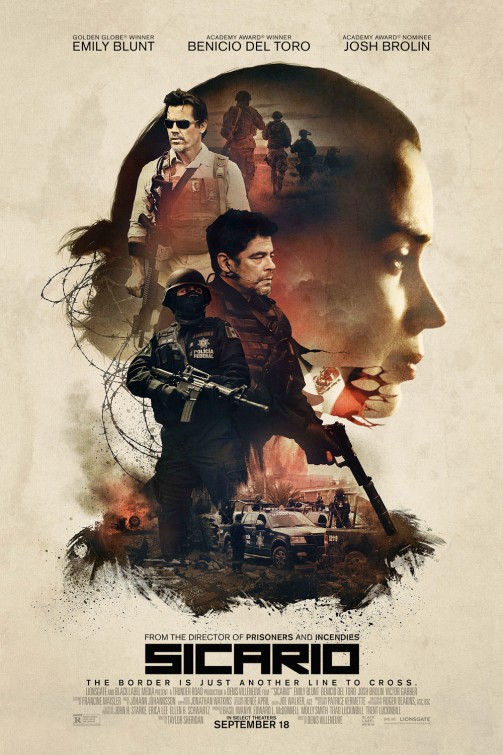
In
the heyday of the political thriller, which we will put as the 1970s for
American cinema, ambiguities were often less moral in nature and more in terms
of the extent of the problem. The
Conversation, a masterpiece by the way, is ambiguous as to the exact nature
and motivations of the forces ranged against poor old Harry Caul, but the film
itself is less ambiguous about what it thinks of the culture of surveillance.
We see the same questions of the nature of the crime and the criminals in The Parallax View and All The President’s Men. Those murky
days were, ironically, a simpler time – the enemy was hidden and seemingly
omnipotent, but they were not us. The films are never in doubt about what they
felt were wrong with the world. Nowadays, however, this division is less clear,
as are the films. Sicario sinks under
some of the same issues that made something like Zero Dark Thirty such a hateful film.
Emily
Blunt plays Kate Macer, an FBI agent recruited into a secret task force which
aims to take down the leader of a Mexican cartel. Under Matt Graver (Josh
Brolin) and the mysterious Alejandro (Benicio Del Toro), Kate is told to watch
and learn. However, Matt and Alejandro may have other reasons for wanting Kate
around, and they may not be trusted.
Sicario is
a thriller about Mexican drug cartels, the American’s complicity in both the
crimes and the general demand which funds and fuels the cartels, the moral
ambiguities in policing across borders and outside the rules. It is a
great-looking film, brilliantly shot by Roger Deakins, tightly directed by
Denis Villeneuve and scored by Jóhann Jóhannsson. It moves at a good pace,
which keeps it serious and largely engaging throughout (apart from a seriously
poor coloured rubber band plot contrivance), a dense and complex plot that
keeps you interested and some tough performances. It is effective, slightly
shrill entertainment, with some fantastic, tense set pieces that largely hold
the film together. As such, it is a very well made and watchable film. But…
Most
political thrillers have a problem striking a decent balance between the complexity
of their politic commentary and entertainment value. Sicario is dark and complex, even uncompromising, plot-wise, but it
is hopelessly shallow in other ways. Its representation of Mexico is downright
insulting – American agents casually climb to the roof of their compound on the
Mexican border and watch gunfights and explosions in Mexico with binoculars. We
do see short sequences detailing small aspects of American corruption (a few
scenes) and complicity (one line), but we get a lot more focus on Americans
getting the job done, state murder compared to finding a vaccine and talk of
the ends justifying the means. Using Kate Macer as an audience surrogate,
finding out as we do how the Mexican drug war ‘really’ works, the film makes
its own world view clear. But since this is primarily a thriller, this world
view is hopelessly inadequate to any real and true understanding of the problem
and strongly stacks the deck to favour of the Americans as emotional
identifiers for the audience. We are always standing on the American side of
the border, looking at the Mexican drug war through the eyes of Americans. The
film offers then a severe view of Mexico and a queasily ambiguous view of the
Americans’ collusion with criminals and their willingness to break the rules.
Where a fairer and more complex film might want to question this very American
idea of the ends justifying the means, Sicario
prefers to avoid this issue.
Sicario is
a very well made film, but it remarkably shallow in terms of what it depicts.
It is hard to work out what the film wants you to think of the Americans’ use
of torture and their collusion with criminals who slaughter whole families. It
represents this world as murky, dense and confusing, but does not dare offer an
opinion, happy presumably that it is largely across the border and not here – a
presumption that is self-serving and certainly not good enough. Where it should
confront and shock but stand above the nastiness shown onscreen, Sicario instead remains mired in the
same ambiguities as the film’s American characters. But when these ambiguities
involve assassination and torture, that’s an uncomfortable place for a film of
any sort to be.
No comments:
Post a Comment